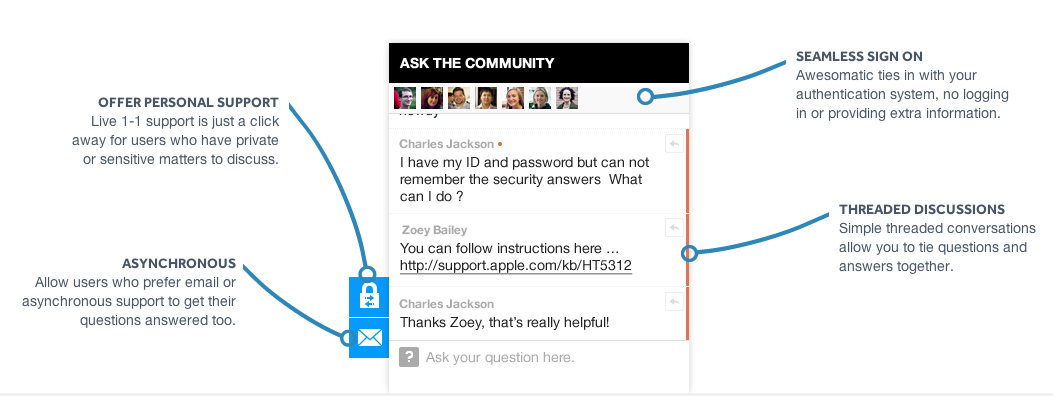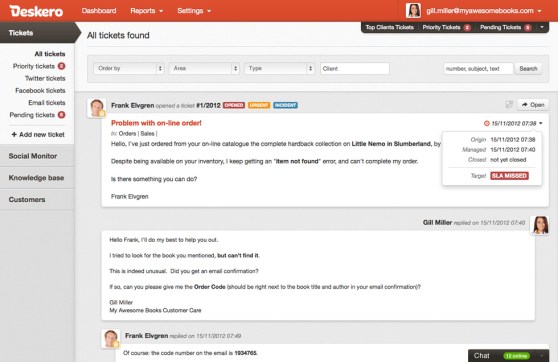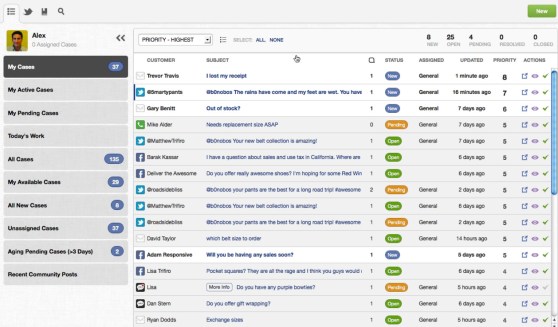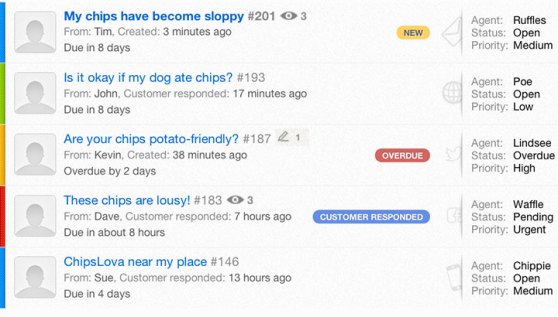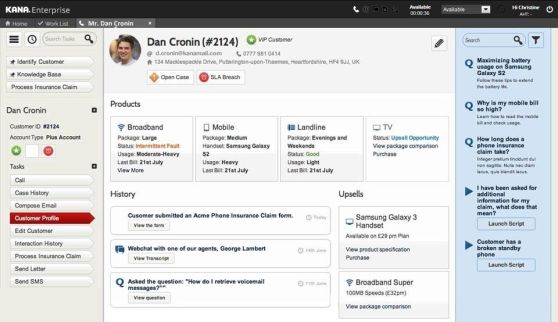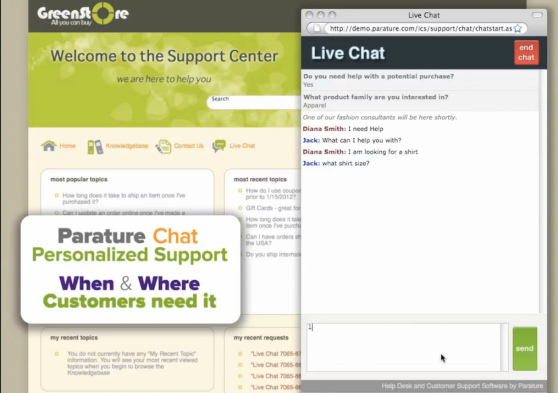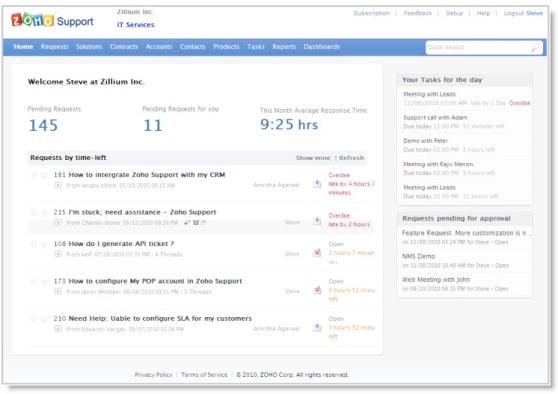The rise of social media should horrify any company with crappy customer service.
Right now, with minimal effort, any disgruntled customer can use a service like Twitter to voice their complaints to the entire world. As we saw with musician Dave Carroll’s crusade against United Airlines, often these complaints can pick up significant support and media attention. And that can mean bad news for whatever company unlucky enough to find itself in the crosshairs.
Better help desk service probably wouldn’t have helped United Airlines, but it could help your company.
Help desk software has changed a lot over the years. It’s gotten prettier, for starters, and it’s more accessible.
But the changes go beyond features: Many companies are realizing that when customers want to vent, they’re going to do it in public. As a result, help desk software is increasingly multichannel, making flagging — and responding to — Twitter mentions and Facebook posts just as important as fielding direct support emails or phone calls.
Other top vendors are focusing heavily on automation, which simplifies the support ticket handling process.
And still other vendors are building major analytics products, helping companies identify and — they hope — reduce bottle necks in the support process.
VentureBeat is researching cloud platforms and we’re looking for your help. We’re starting with marketing — specifically marketing automation. Help us by filling out a survey, and you’ll get the full report when it’s complete.
In other words, this might be the most interesting time for help desk software in, well, ever. Here are a few of the newer, more nimble help desk companies out there.
What did we miss? Let us know in the comments and tell us why your favorites stand out.
Awesomatic
While Awesomatic is one of the newer services on this list, it’s different among help desk services because it exists inside of your app, not on a separate website. The idea, as the company explains it, is “engage users where they are.”
Other features include real-time analytics, threaded conversations, and fielding questions both via chat and email. (Awesomatic calls it “asynchronous” support.)
Pricing: The basic version runs for $50 for 100 active users, and the “professional” plan costs $780 for 10,000 active users.
Deskero
As with most help desk software suites, Deskero enables support agents to field questions from a variety of sources, including email, phone calls, and chat. But what sets the service apart is that it also includes support for social networks like Twitter, Facebook, and Linkedin, enabling users to automate the importing of any interaction no matter where it’s initiated.
Pricing: Deskero’s services come in four lines — “Newbie,” “Social,” “Business,” and “Power” — which run from free (for one agent) to $78 per user per month.
Desk.com
Like Deskero, Salesforce’s Desk.com puts a social spin on help desk software. With minimal set-up, companies can field questions from not only phone calls and email but Facebook and Twitter as well. As Salesforce noted last year, the service is easy to set up as well: When apparel company Bonobos signed on, it set everything up within a single weekend.
Pricing: Desk.com starts at $49 per agent per month. It also offers flex pricing, which runs for $1 per part-time agent per hour.
Freshdesk
Like many of the services listed here, Freshdesk’s help desk offers many of the features companies have come to expect. These features include team-wide support inboxes, automated ticket dispatching, social customer support, and community forums. Freshdesk also offers built-in ticket time-tracking, which it says helps find bottlenecks in the support process.
It has a gamification element as well. While helping customers might normally be enough for agents, Freshdesk also turns each ticket into a chance to earn points.
Pricing: Freshdesk’s “sprout” plan is free for the first three agents. Its more advanced “estate” service is $40 per agent per month.
Kana
Kana’s help desk software is just about everywhere these days. Its clients include 900 enterprises, half of the Fortune 100, and 250 government agencies.
Kana’s software comes in three lines: Kana Enterprise, for example, helps large companies unify the agency experience across channels; Kana Express offers multichannel support for midsize companies and includes email management, live chat, social media management, and web self-service.
Pricing: Kana provides pricing information on request.
Kayako
Kayako’s flagship helpdesk software is Kayako Fusion, a multichannel helpdesk solution that supports conversations via email, live chat, and voice. Fusion also offers built-in, one-click remote desktop and screenshot sharing. While Kayko is ready to go out-of-the-box, it’s also customizable, enabling you to tweak various and fields.
Pricing: Fusion on Demand is $49 per agent per month. Free trials are available.
Parature
Rather than offer a single product for all customers, Parature is all about making it easy to tailor its service around specific needs and workflow. The idea, as the company explains it, is to give customers the features that are important rather than waste money on “features or functionality you don’t use or need.” So it’s got multichannel options, such as mobile, self-service, and social media. Parature also makes a big deal about its scalability, which enables customers to implement its software on top of existing systems and with minimal effort.
Pricing: Because Parature’s software can be customized for customers’ specific needs, the company doesn’t give a clear-cut idea of pricing. It does note, however, that it bases its pricing on the number of agents using the software, making it similar to the pricing structures discussed above.
SupportBee
To understand SupportBee’s philosophy on help desk software, read the company’s own words: “While everyone else is building a better Outlook, we’re focused on building a Gmail for support.”
In other words, SupportBee’s take on help desk software is deeply email-focused. When a customer sends a message to your support email address, SupportBee creates a new, unanswered ticket, and the process kicks in from there. While the approach is simple, SupportBee says that it’s powerful enough that some of its customers use it to handle thousands of tickets a day.
Pricing: SupportBee is different from other help desk vendors in that its pricing is based on ticket volume, not the number of agents a company uses. The “startup” package, for example, runs for $19 a month for 300 tickets. The more advanced versions run for $349 for 15,000 tickets per month.
Zendesk
Zendesk’s place in this list is probably a given. Notable Zendesk clients include Box, Groupon, Disney, and Rovio. Those are very different sorts of companies, which is a good indication of how versatile Zendesk’s software is.
The company’s latest release is Help Center, a Quora-esque knowledge-base app born out of a simple observation: Customers are four times as likely to use self-service systems then they are to call a company asking for help. Zendesk also offers a community discussion portal, which it claims “builds customer relationships outside support tickets.”
Pricing: Zendesk pricing starts at $1 per month per agent and goes all the way up to $195 for its “white glove” enterprise elite service. The company also offers free trials, which it says even big companies like Adobe and Sears once used.
Zoho Support
Like many of the other offerings here, Zoho Support’s take on help desk software checks all the the boxes: In addition to offering multichannel support and simple automation, Zoho is also easy to both implement and scale. Also, similar to SupportBee, Zoho also offers plans wherein small businesses pay just for the number of requests they handle, not how many agents they happen to have.
Pricing: Zoho’s free plan offers support for unlimited agents, but its limited compared to the professional and enterprise plans, which run for $12 and $25 per agent per month.

